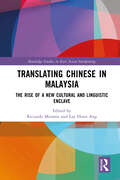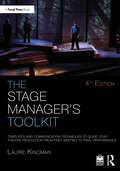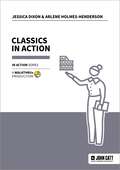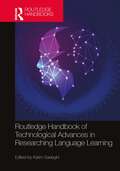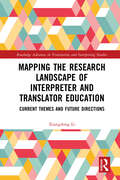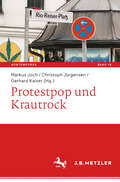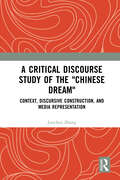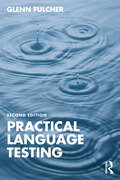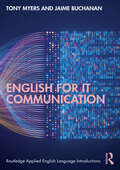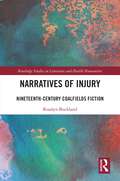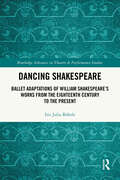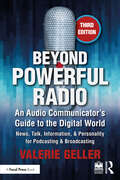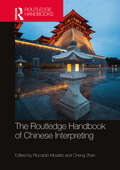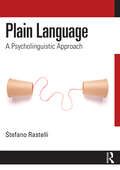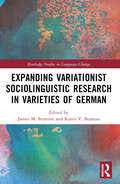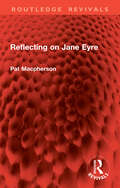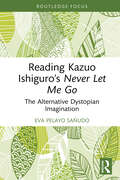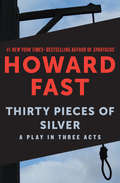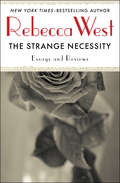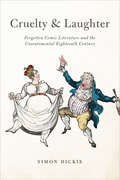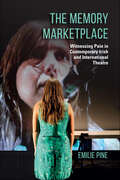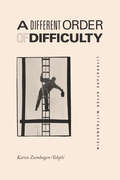- Table View
- List View
Translating Chinese in Malaysia: The Rise of a New Cultural and Linguistic Enclave (Routledge Studies in East Asian Interpreting)
by Riccardo Moratto Lay Hoon AngShedding light on the nuances of cross-cultural communication, this edited volume offers insights into how Chinese Malaysians, a major ethnic group, navigate the complexities of translating across diverse languages.This book unveils the unique landscape of translation from Chinese in Malaysia, where the emphasis lies not just in theoretical nuances but in the practical application of bridging linguistic divides. The narrative unfolds the dedicated efforts of the local Chinese community, passionately engaged in translating literary gems and unraveling language intricacies. It provides a platform to explore how Chinese Malaysians use translation as a tool to maintain and transmit their linguistic and cultural legacy. By highlighting specific works and creative endeavours, the authors showcase the unique contributions of the Chinese community to the broader field of translation, fostering an appreciation for the cultural and artistic dimensions embedded in the translated texts.This book serves as an educational tool for students, scholars, and researchers interested in translation studies and multiculturalism. It also provides a comprehensive exploration of the challenges and opportunities faced by Chinese translators in Malaysia, encouraging further research and fostering a deeper understanding of the field.
The Stage Manager's Toolkit: Templates and Communication Techniques to Guide Your Theatre Production from First Meeting to Final Performance (The Focal Press Toolkit Series)
by Laurie KincmanThe Stage Manager’s Toolkit, Fourth Edition, provides a comprehensive account of the role of the stage manager for live theatre with a focus on both written and verbal communication best practices.The book outlines the duties of the stage manager and assistant stage manager throughout a production, discussing not only what to do but why. It also identifies communication objectives for each phase of production, paperwork to be created, and the necessary questions to be answered to ensure success. This fourth edition includes: a new chapter devoted to documenting movement which includes both intimacy choreography and stage combat; updated and expanded information on using technology and social media; expanded information on the digital prompt book and other digital and web-based tools; updated paperwork examples; more information on Equity practices for the student and early career stage managers. Written for the stage management student and early career stage manager, this book is a perfect addition to any university Stage Management course.A companion website hosts customizable paperwork templates, instructional videos, links to additional information, teacher tools for individual chapters, and a bonus section on teaching stage management. To access these resources, visit www.routledge.com/cw/kincman.
Classics in Action
by Jessica Dixon Dr Arlene Holmes-HendersonClassics is one of the most varied and interdisciplinary of all subjects; it includes literature, history, philosophy, art and archaeology. There is growing interest among teachers in the subject, and recent studies have shown that learning Latin and/or Greek can have a positive impact on student outcomes in English and literacy.Jessica Dixon and Arlene Holmes-Henderson showcase ideas from their own teaching experience, plus innovative examples from a range of schools, to provide strategies for teaching Latin, Greek, Classical Civilisation and Ancient History that will enrich, enliven and extend your teaching practice.Inspiring and eye-opening, this will be an enjoyable and useful read for all teachers who are currently teaching, training to teach, or interested in teaching classical subjects and related disciplines, in primary or secondary schools.
Classics in Action
by Jessica Dixon Dr Arlene Holmes-HendersonClassics is one of the most varied and interdisciplinary of all subjects; it includes literature, history, philosophy, art and archaeology. There is growing interest among teachers in the subject, and recent studies have shown that learning Latin and/or Greek can have a positive impact on student outcomes in English and literacy.Jessica Dixon and Arlene Holmes-Henderson showcase ideas from their own teaching experience, plus innovative examples from a range of schools, to provide strategies for teaching Latin, Greek, Classical Civilisation and Ancient History that will enrich, enliven and extend your teaching practice.Inspiring and eye-opening, this will be an enjoyable and useful read for all teachers who are currently teaching, training to teach, or interested in teaching classical subjects and related disciplines, in primary or secondary schools.
Routledge Handbook of Technological Advances in Researching Language Learning
by Karim SadeghiThe Routledge Handbook of Technological Advances in Researching Language Learning is the first volume to bring together the extant scholarship on the nature and role of digital technology in conducting second language research.The Handbook showcases technological advances, including issues and considerations, affecting research conduction in second language education. The contributions focus on the role of digital technology in researching second language education, second language acquisition, and applied linguistics. Contributions by both seasoned and junior scholars feature empirical studies and methodological and/or theoretical discussions of technological tools used (or tools that can be used) for conducting research into various aspects of second language learning and acquisition. This book will primarily appeal to academic specialists, practitioners, and professionals in the field of applied linguistics and second language education. The book will also be informative for scholars and professionals in disciplines such as educational technology and TESOL.
Mapping the Research Landscape of Interpreter and Translator Education: Current Themes and Future Directions (Routledge Advances in Translation and Interpreting Studies)
by Xiangdong LiMapping the Research Landscape of Interpreter and Translator Education explores research themes in interpreter and translator education based on a systematic review of more than 20 years of research in the field. The book focuses on the ten research themes on the chain of curriculum development and evaluation, specifically, market needs analysis, content conceptualisation, learning needs analysis, teaching objectives, teaching beliefs, syllabus design, material development, instruction and/or effect, assessment, and course evaluation. It also touches upon the other 14 research themes, for example, trainer education, admissions, learner traits, thesis and research training, pre-service preparation, certification, in-service training, client education, and translation and interpreting as a means to education. The discussion of each theme is accompanied by a synthesis of its sub-themes, typical research cases, research prospects, and suggested reading. As a guide, it supports teachers by illustrating how to combine teaching and research in university settings and offers ways to integrate research into pedagogy.This book is a go-to reference for trainers and a hands-on guide for academics, researchers, and postgraduate students specialising in translation and interpreting curriculum development and pedagogy research.
Protestpop und Krautrock (Kontemporär. Schriften zur deutschsprachigen Gegenwartsliteratur #18)
by Christoph Jürgensen Gerhard Kaiser Markus JochDie knapp eineinhalb Jahrzehnte nach 1970 erscheinen im Rückblick als eine Art Sattelzeit der deutschen Popmusik: Fast alle maßgeblichen, zukunftsträchtigen Stile, Artikulations- und Inszenierungsweisen des deutschen Pop entwickeln und etablieren sich in diesem Zeitraum. Das sich in zunehmendem Maße ausdifferenzierende Spektrum reicht vom Protestpop über den sogenannten Krautrock bis hin zu einer auf Breitenwirksamkeit setzenden Rockmusik sowie den später unter dem ebenso unpräzisen wie wirkmächtigen label „Neue Deutsche Welle“ rubrizierten Spielweisen. Der Band wirft zum einen einen neuen Blick auf Geschichte und Spielarten des äußerst heterogenen Protestpop vom Anarcho-Rock der Ton Steine Scherben bis zu BAP, den Lindenberg in punkto Massenresonanz überholenden Kölschrockern. Zum anderen analysiert der Band die musikalischen, textlichen und performativen Inszenierungsstrategien des Krautrock der frühen 1970er Jahre. Der vor allem von der englischsprachigen Popbeobachtung zunächst pejorativ verwendete Begriff des Krautrock ist freilich diffus, da er ein Spektrum ganz unterschiedlicher Stile umfasst. Dieses reicht vom Rock bis zu den elektronischen Klangexperimenten von so unterschiedlichen Bands wie Tangerine Dream, Cluster oder Kraftwerk. Einigendes Band dieser unterschiedlichen Akteure scheint jedoch die dezidierte Abgrenzung von angloamerikanischen Vorbildern zu sein.
A Critical Discourse Study of the "Chinese Dream": Context, Discursive Construction, and Media Representation (Cultural Discourse Studies Series)
by Junchen ZhangZhang’s book focuses on the analysis of the sociohistorical context, linguistic patterns of discursive construction, and media representations of the “Chinese Dream” in Mainland China, Hong Kong, and the United States.Analyzing data from the Chinese leader’s speeches and articles from China Daily, the South China Morning Post, and the New York Times, the author provides insights into the understanding of contemporary Chinese society through a critical discourse analysis of the “Chinese Dream” and its mediatized construction. Focusing on the discursive construction, the book examines the Chinese leader Xi Jinping’s narratives on the “Chinese Dream” from multidimensional perspectives, such as thematic representations, discursive strategies, and narrative frames, which emphasize the overall structure of the “Chinese Dream” as a political discourse. Methodologically, Zhang combines a discourse-historical approach, corpus linguistics, and framing analysis into a complementary framework, which draws merits from the three approaches.This innovative research volume will be of interest to academics, researchers, and students in the fields of discourse analysis, political research, Chinese politics, and East Asian studies.
Practical Language Testing
by Glenn FulcherPractical Language Testing equips you with the skills, knowledge and principles necessary to understand and construct language tests. This practical guide offers step-by-step guidelines on the design of assessments within the classroom and provides the necessary tools to analyse and improve assessments, as well as deal with alignment to externally imposed standards. Testing is situated both within the classroom and within the larger social context, and readers are provided with the knowledge necessary to make realistic and fair decisions about the use and implementation of tests.Now in its second edition, this respected text has been substantially revised and updated, including a new chapter on validity drawing from the author's Messick Award for innovation in validity theory and practice. It also includes expanded coverage of standardised testing and learning-oriented assessment, and introduces task design features, including authenticity, and automated assessment.With its frequently updated online resources to support language assessment (https://languagetesting.info/), this book is the ideal introduction for students of applied linguistics, TESOL and modern foreign language teaching, as well as practising teachers required to design or implement language testing programmes.
English for IT Communication (Routledge Applied English Language Introductions)
by Tony Myers Jaime BuchananEnglish for IT Communication provides a comprehensive introduction for students and professionals studying IT or computer science and covers all forms of technical communication from emails and memos through procedures to reports and design specs. In each case, the book offers multiple real-world examples, looking at who the texts are written for, what their purpose is, and how these affect what is on the page.Key features of this book include● How to write for different audiences and purposes● How to design documents for ease of access and understanding● How to communicate in multimodal media● How to reference in IEEE● Multiple different examples and breakdowns of common text types to show how they are written and to produce an understanding of quality in each● Online support material including authentic examples of different workplace genres and a reference section covering relevant research studies and weblinks for readers to better understand the topics covered in each chapter● Internationalized coverage of IT communication exemplarsThis book is an accessible guide to writing effective forms of IT communications of the kind needed for all IT degree programs which aim to prepare students for the modern workplace. Practical and clearly written, it is designed to introduce readers to features of the most common genres in IT and computer science.
Narratives of Injury: Nineteenth-Century Coalfields Fiction (Routledge Studies in Literature and Health Humanities)
by Rosalyn BucklandNarratives of Injury redescribes the history of injury from the perspective of those most at risk, rather than medical professionals and other outsiders. Refocusing on the first-hand perspectives found in literary texts and journalistic accounts, it uncovers a self-conscious tradition of mining stories running through nineteenth-century writing. The book examines both non-canonical authors and famous novelists, including Charles Dickens, Joseph Skipsey, G. A Henty, E. H. Burnett, George Eliot, Edward Tirebuck, H.G. Wells and D. H. Lawrence. Their narratives revise our understanding both of injury and of the radical potential of fiction. Sudden physical injuries have often been configured as fundamentally unknowable by the victims themselves, particularly in studies of nineteenth-century literature and culture. Likewise, narratives of psychological trauma have been largely understood, in Cathy Caruth's words, as the 'attempt to master what was never fully grasped in the first place.' Such readings privilege the reader as a necessary interpreter of physical or psychological injury. By contrast, Narratives of Injury reasserts the significance of patients' own experiences, choices and actions.
Dancing Shakespeare: Ballet Adaptations of William Shakespeare’s Works from the Eighteenth Century to the Present (Routledge Advances in Theatre & Performance Studies)
by Iris Julia BührleDancing Shakespeare is the first history of ballets based on William Shakespeare’s works from the birth of the dramatic story ballet in the eighteenth century to the present. It focuses on two main questions: "How can Shakespeare be danced?" and "How can dance shed new light on Shakespeare?"The book explores how librettists and choreographers have transposed Shakespeare’s complex storylines, multifaceted protagonists, rhetoric and humour into non-verbal means of expression, often going beyond the texts in order to comment on them or use them as raw material for their own creative purposes.One aim of the monograph is to demonstrate that the study of wordless performances allows us to gain a deeper understanding of Shakespeare’s texts. It argues that ballets based on Shakespeare’s works direct the audience’s attention to the "bare bones" of the plays: their situations, their characters, and the evolution of both. Moreover, they reveal and develop the "choreographies" that are written into the texts and highlight the importance of movements and gestures as signifiers in Shakespeare’s plays.This book will be of interest to students and scholars of literature, dance, and music, as well as to an international readership of lovers of Shakespeare, ballet, and the arts.
Beyond Powerful Radio: An Audio Communicator’s Guide to the Digital World - News, Talk, Information, & Personality for Podcasting & Broadcasting
by Valerie GellerA complete guide to becoming a successful communicator, Beyond Powerful Radio teaches time-tested techniques that work in any format – radio, TV, podcast, or online.Learn how to get, keep, and grow audiences with powerful storytelling, and become a dynamic presenter. This book holds the tools needed to create winning content; tell compelling stories; build your brand; develop talent; produce a show; report the news; sell; and write commercials. Practical tips and methods from over 50 top experts from across the world of media illuminate interviewing, managing talent, becoming an authentic personality, and getting started in the business. This fully revised edition features new sections on: Podcasting: what you need to know to create, market, and produce on-demand audio. Social media: a guide to best use and social media safety. Storytelling: an introduction to the “Prism” method, Story Spine, and other proven easy-to-try techniques designed to compel audiences. Artificial Intelligence: how to harness AI in audio and visual media according to experts. Synergy across all platforms: tips and techniques to work effectively across all media formats. Whether you’re a professional with years in the industry, an instructor with a class full of media hopefuls, or you are just starting out as a podcaster or radio host, this book will help you reach your goals.A full Instructor Manual is available with complete lesson plans for broadcast instructors. The Instructor Manual is available for download here: http://routledgetextbooks.com/textbooks/instructor_downloads.
The Routledge Handbook of Chinese Interpreting (Routledge Handbooks in Translation and Interpreting Studies)
by Riccardo Moratto Cheng ZhanThis Handbook sheds light on the current trends in interpretation research, with a particular focus on China and Chinese interpreting.Over the years, the field of Chinese interpreting has experienced remarkable growth, not only in terms of market demand but also in research trends within the discipline of translation studies. In China, specifically, interpretation studies have been at the forefront of developments in pioneering new approaches and methodologies. The chapters in this Handbook delve into various aspects of interpretation research, encompassing both theoretical frameworks and practical applications. From examining the intricacies of consecutive and simultaneous interpretation to exploring the role of technology in shaping the future of the profession, the contributors offer valuable insights into the advancements and challenges within Chinese interpreting. By showcasing the latest research trends and sharing valuable experiences from renowned scholars and practitioners, this collection contributes to the ongoing dialogue surrounding interpretation studies.This Handbook is a comprehensive resource for academics, researchers, students, and professionals seeking to deepen their understanding of Chinese interpreting and its evolving landscape.
Plain Language: A Psycholinguistic Approach
by Stefano RastelliPlain Language: A Psycholinguistic Approach employs principles from the field of psycholinguistics to explore factors that make a sentence or text easy or difficult to process by the cognitive mechanisms that support language processing, and describes how levels of difficulty might function within bureaucratic power structures.Drawing from experimental data on readability, the author employs a metaphor of three "ghost" readers in the mind that exist and interact with each other: the syntactic reader (the one searching for the structure), the statistical reader (the one driven by previous experiences), and finally the pragmatic reader (the one searching for meaning). The penultimate chapter concerns a novel psycholinguistic experiment showing that complexly written texts may prevent adult citizens with average literacy skills from accessing important information related to their health, work, and right to representation, thereby drawing a line between the psycholinguistics of language comprehension and the maintenance of existing power structures.Written in plain language itself, this book is designed to be easily understandable from an undergraduate level and makes for fascinating reading for all students and researchers in linguistics and psycholinguistics, as well as supplementary reading for students of sociolinguistics and related modules. Students, researchers, and interested general readers will develop an understanding that knowing how the mind reads and understands language can help stakeholders to ensure equal access to information and democratic processes.
Verb Forms at A Glance - Fourth Edition
by V. C. Khatri Nikunj Khatri"Verb Forms at a Glance" by V.C. Khatri is a comprehensive reference guide designed for learners, educators, and language enthusiasts to master English verb forms. This book systematically categorizes and explains regular and irregular verbs, providing clear rules and examples for constructing verb forms across all tenses. It includes an alphabetical listing of verbs with their base forms, past tense, and past participles, making it a quick and reliable reference. Additional sections detail the usage of participles, nuanced rules for forming verb endings, and distinctions between active and passive voice. With its practical examples, pronunciation guides, and focus on commonly used verbs, this book is an indispensable tool for improving grammatical accuracy and fluency in English.
Expanding Variationist Sociolinguistic Research in Varieties of German (Routledge Studies in Language Change)
by Karen V. Beaman James M. StrattonThis collection provides a broad account of variationist sociolinguistic research on varieties of German, with the goals to encourage greater geolinguistic diversity in the field and to expand our understanding of language variation and change.This book illustrates that incorporating a wider variety of language data in sociolinguistic studies provides a broader, more holistic picture of variation and change. On the one hand, this book examines how variationist methods can contribute to the study of varieties of German, with each chapter following the principles of variationist sociolinguistics. On the other hand, the chapters examine how both intra- and extra-linguistic factors can influence variation and change. The volume also seeks to provide a broader understanding of German variation and change across time and space. This book highlights how the study of varieties of German through a variationist lens can offer new insights into language change more broadly, with applications for further research into other languages. This volume will be of most interest to scholars in language change, sociolinguistics, dialectology, and historical linguistics.
Reflecting on Jane Eyre (Routledge Revivals)
by Pat MacphersonJane Eyre is a feminist Pilgrim’s Progress in which the heroine asserts the moral equality and responsibility of men and women—an outrageous claim for a female, and moreover a governess, to make. Pat Macpherson reads in Jane Eyre the dramatic dynamic of adolescence itself, as a Gothic landscape of battles and pacts, seductions and betrayals, transgressions and policings, where identity is forged in relation to social norms of class, gender, race, generation, and nationality. Her exuberant narration connects the personal to the political in Jane’s relations with Rochester, the rake in need of reformation, Bertha, his mad wife, and St John, the parson whose cross is paternalism.Pat Macpherson’s Reflecting on Jane Eyre (first published in 1989) shows how the novel itself can be the territory for women’s exploration of a morality of desire and power, alternative to the material and sexual double-standard of middle-class men. This book will be of interest to students and researchers of English literature, feminist studies, and sociology.
Reading Kazuo Ishiguro’s Never Let Me Go: The Alternative Dystopian Imagination (Routledge Focus on Literature)
by Eva Pelayo SañudoReading Kazuo Ishiguro’s Never Let Me Go: The Alternative Dystopian Imagination aims to offer innovative perspectives for the analysis of Nobel-prize winner Kazuo Ishiguro’s oeuvre through a focus on the genre of science fiction, particularly the novel Never Let Me Go (2005). The study proposes the term "intimate dystopia" to reflect on the passage from totalitarian or external oppressive forces to more "subtle" systems of power. Its interdisciplinary approach combines, apart from literary theory on different genres such as science fiction and memory, race studies, feminism and ecocriticism. It is based on an exhaustive critical and textual analysis that allows for a thorough and nuanced understanding of Ishiguro’s multi-layered novel, covering themes such as the ethical dimensions and gender implications of caregiving, the dystopian portrayal of the environment, the significance of art in the existence of marginalized groups and the genre-related complexities of the text.
Topophrenia: Place, Narrative, and the Spatial Imagination (The Spatial Humanities)
by Robert T. Tally Jr.What is our place in the world, and how do we inhabit, understand, and represent this place to others? Topophrenia gathers essays by Robert Tally that explore the relationship between space, place, and mapping, on the one hand, and literary criticism, history, and theory on the other. The book provides an introduction to spatial literary studies, exploring in detail the theory and practice of geocriticism, literary cartography, and the spatial humanities more generally. The spatial anxiety of disorientation and the need to know one's location, even if only subconsciously, is a deeply felt and shared human experience. Building on Yi Fu Tuan's "topophilia" (or love of place), Tally instead considers the notion of "topophrenia" as a simultaneous sense of place-consciousness coupled with a feeling of disorder, anxiety, and "dis-ease." He argues that no effective geography could be complete without also incorporating an awareness of the lonely, loathsome, or frightening spaces that condition our understanding of that space. Tally considers the tension between the objective ordering of a space and the subjective ways in which narrative worlds are constructed. Narrative maps present a way of understanding that seems realistic but is completely figurative. So how can these maps be used to not only understand the real world but also to put up an alternative vision of what that world might otherwise be? From Tolkien to Cervantes, Borges to More, Topophrenia provides a clear and compelling explanation of how geocriticism, the spatial humanities, and literary cartography help us to narrate, represent, and understand our place in a constantly changing world.
Thirty Pieces of Silver: A Play in Three Acts
by Howard FastA couple in Washington, DC, is torn apart when a friend is accused of treasonJane and David Graham live upper-middle-class lives in mid-century Washington, DC. Jane minds the home with the help of a fulltime maid, and David works at the Treasury Department. But when the FBI visits their house one evening to ask questions about a friend&’s political beliefs, the answers the two give separately cause them both to wonder whether they truly know each other. Soon nothing is certain as the ideological fears plaguing the nation threaten to destroy Jane and David&’s family. Howard Fast&’s first play, Thirty Pieces of Silver was performed in several countries, from Australia to Europe, and offers an insightful look at the destructive power of reactionary politics in America. This ebook features an illustrated biography of Howard Fast including rare photos from the author&’s estate.
The Strange Necessity: Essays and Reviews (Virago Modern Classics Ser. #2313)
by Rebecca WestIn this intellectually challenging collection of literary criticism, Rebecca West undertakes the question of art&’s value, examining the works of her contemporaries and their places in history &“The Strange Necessity,&” one of the twelve essays collected here and first published in 1928, anchors West&’s quest to understand why art matters and how aesthetics of every caliber can not only inspire but reveal the author&’s inner world. Whether juxtaposing Ulysses&’s prose with Pavlov&’s research, or comparing Sinclair Lewis with actress and pianist Yvonne Printemps, West finds that a satisfying emotion overrides an artistic work&’s form. Her intricately crafted essays reveal her experience in the literary circles of the twenties and thirties and the important role this question played in her own writing. West&’s keenly observed criticism offers invaluable insight not only into her work but into her impressions of early twentieth century literature.
Cruelty & Laughter: Forgotten Comic Literature and the Unsentimental Eighteenth Century
by Simon DickieEighteenth-century British culture is often seen as polite and sentimental—the creation of an emerging middle class. Simon Dickie disputes these assumptions in Cruelty and Laughter, a wildly enjoyable but shocking plunge into the forgotten comic literature of the age. Beneath the surface of Enlightenment civility, Dickie uncovers a rich vein of cruel humor that forces us to recognize just how slowly ordinary human sufferings became worthy of sympathy.Delving into an enormous archive of comic novels, jestbooks, farces, variety shows, and cartoons, Dickie finds a vast repository of jokes about cripples, blind men, rape, and wife-beating. Epigrams about syphilis and scurvy sit alongside one-act comedies about hunchbacks in love. He shows us that everyone—rich and poor, women as well as men—laughed along. In the process, Dickie also expands our understanding of many of the century’s major authors, including Samuel Richardson, Lady Mary Wortley Montagu, Tobias Smollett, Frances Burney, and Jane Austen. He devotes particular attention to Henry Fielding’s Joseph Andrews, a novel that reflects repeatedly on the limits of compassion and the ethical problems of laughter. Cruelty and Laughter is an engaging, far-reaching study of the other side of culture in eighteenth-century Britain.
The Memory Marketplace: Witnessing Pain in Contemporary Irish and International Theatre (Irish Culture, Memory, Place)
by Emilie PineWhat happens when cultural memory becomes a commodity? Who owns the memory? In The Memory Marketplace, Emilie Pine explores how memory is performed both in Ireland and abroad by considering the significant body of contemporary Irish theatre that contends with its own culture and history. Analyzing examples from this realm of theatre, Pine focuses on the idea of witnesses, both as performers on stage and as members of the audience. Whose memories are observed in these transactions, and how and why do performances prioritize some memories over others? What does it mean to create, rehearse, perform, and purchase the theatricalization of memory? The Memory Marketplace shows this transaction to be particularly fraught in the theatricalization of traumatic moments of cultural upheaval, such as the child sexual abuse scandal in Ireland. In these performances, the role of empathy becomes key within the marketplace dynamic, and Pine argues that this empathy shapes the kinds of witnesses created. The complexities and nuances of this exchange—subject and witness, spectator and performer, consumer and commodified—provide a deeper understanding of the crucial role theatre plays in shaping public understanding of trauma, memory, and history.
A Different Order of Difficulty: Literature after Wittgenstein
by Karen Zumhagen-YekpléIs the point of philosophy to transmit beliefs about the world, or can it sometimes have higher ambitions? In this bold study, Karen Zumhagen-Yekplé makes a critical contribution to the “resolute” program of Wittgenstein scholarship, revealing his Tractatus Logico-Philosophicus as a complex, mock-theoretical puzzle designed to engage readers in the therapeutic self-clarification Wittgenstein saw as the true work of philosophy. Seen in this light, Wittgenstein resembles his modernist contemporaries more than might first appear. Like the literary innovators of his time, Wittgenstein believed in the productive power of difficulty, in varieties of spiritual experience, in the importance of age-old questions about life’s meaning, and in the possibility of transfigurative shifts toward the right way of seeing the world. In a series of absorbing chapters, Zumhagen-Yekplé shows how Kafka, Woolf, Joyce, and Coetzee set their readers on a path toward a new way of being. Offering a new perspective on Wittgenstein as philosophical modernist, and on the lives and afterlives of his indirect teaching, A Different Order of Difficulty is a compelling addition to studies in both literature and philosophy.
